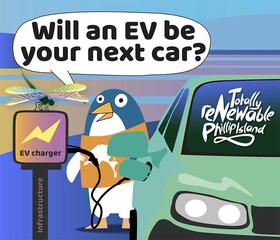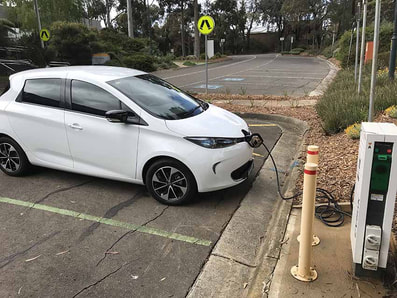 Like to buy an electric vehicle but deterred by the cost?
Like to buy an electric vehicle but deterred by the cost? TRPI wants to hear from you, Graphic: Jeni Jobe
ON Wednesday I was sitting in a café talking with a dear friend (face mask carefully tucked under chin while sipping coffee) about how to fix the climate change mess when the earth shook. Silence descended as everyone was stunned by the shaking leaves of plants, clinking of glasses, and rumbling under our feet.
After a moment my friend broke the silence: “I’m just waiting for the four horsemen of the apocalypse to arrive now.”
It’s in this space that so much is happening at grass roots level. Totally Renewable Phillip Island (TRPI), a community group targeting 100% renewable and net zero carbon emissions by 2030, is one of many groups committed to taking action.
And the momentum is growing. In 2019 Bass Coast Shire declared a Climate Emergency and earlier this year the council adopted a climate action plan to achieve net zero emissions by 2030.
The Plan identifies 15 direct actions that households can take, three of which focus on transport: switch to low or no carbon transport; purchase more efficient passenger vehicles; and purchase an electric vehicle (EV).
EVs are more efficient than standard combustion engines, the plan notes. “Even when powered by the standard grid electricity, EVs reduce carbon emissions, noise and tailpipe pollution, improving public health and reducing ecological damage. They also provide energy storage potential which could support future energy grid flexibility.”
Well, fantastic. But how does owning an EV work out in practice?
We consulted Michael and Theresa who live in Corinella and are the proud owners of a 2019 Renault Zoe ZE40, a small car that is the best-selling EV in Europe. They’ve had the car for one year as of this week and bought it to take a small personal action in response to climate change. Importantly the 300km range suited their recent move to Corinella.
“We visit family in Warragul and Ferntree Gully, have commuted to work in Pakenham and make many trips to Wonthaggi for shopping.”
 "Our Zoe, day one."
"Our Zoe, day one." “Yes, for a comparable small car but we don’t have the running costs so definitely an economic purchase over time.”
How much does it cost to run an EV compared to a petrol vehicle?
“Much cheaper to run. A 300km charge will cost $7.20 off peak or $14 peak from grid power (current Origin charges) but we are able to charge for little or no cost from our solar system. Minimal service cost, for example brake pads last much longer due to using regenerative braking to slow down in most situations and no oil to change.
“We have 10kw of solar on the house roof and a Zappi 22kw charger in the garage. We can fully charge in just over 2.5 hours. We often just charge for 1 hour before going out and gain an additional 100km + in the battery which is fine for travelling in the Bass Region. We are learning to time charging with peak solar output to reduce our carbon footprint & costs or, if required, we use off peak grid power to maximise economy.”
EVs are becoming more prevalent and more affordable year by year. Many countries, including the UK, China, Japan, France and Canada, have banned the sale of new petrol and diesel cars by 2030. The Victoria Climate Change Strategy is targeting 50% of all new car sales to be zero emissions vehicles by 2030.
But back to Michael and Theresa’s comment that their 2019 Renault Zoe ZE40 is an economic purchase over time but more expensive to buy. The upfront expense can be challenging. I was able to buy my own Hyundai Kona EV through my small business as a work car with a monthly payment plan, but I was fortunate that my circumstances allowed it – otherwise the upfront cost of an EV would have been beyond my grasp.
So how do we bring about easy access to EVs for the community to align with Bass Coast’s climate action plan?
Totally Renewable Phillip Island recently contacted the Good Car Company (part of EnergyLab, dedicated to the clean energy transition) which buys second hand EVs in Japan and brings them to Australia for resale. Their model is a bulk buy for interested communities. They have worked with communities including Hepburn, Southern Tasmania, Canberra and Geelong.
We asked the Good Car Company if they could offer their second-hand EVs for sale on Phillip Island and Bass Coast. They were supportive of a bulk buy but want to understand what interest there is in Bass Coast.
Have you thought about buying an EV? If you have, please fill out the TRPI survey or respond via direct link. The survey takes a couple of minutes. Note, this is not a commitment to buy. Let’s just see where it takes us.
Zoë Geyer is co-ordinator of Totally Renewable Phillip Island.